He was an intelligent man and he'd flown high in his career. I know that from the conversation we'd had up till that point. The point when he said, "But we don't need libraries, because it's all online now."
You can imagine the rattle of adrenaline through my veins. But I've learnt that in these situations a rant doesn't help matters. You have to go straight to the point.
"But how will you create readers," I asked, "Without libraries?"
"You can learn to read online," he suggested, clearly not having thought this through. But he's not alone in not having thought this through.
We're not winning the war to keep libraries (both public and school) valued and funded. We’re winning some battles but the enemy keeps popping up elsewhere, just as strong, blinkered and ignorant as before. We’re not winning it because of a fundamental misunderstanding by far too many people of what school libraries do. And what they do that nothing else can do, least of all the Internet. Unfortunately, many of these people are our elected politicians, entrusted with the education of our children and claiming to want a “fairer” society.
Libraries – and, crucially, their trained librarians – create readers. It’s that simple. Without the libraries you used as a young child, you would not be the reader you are now. I doubt any of us became a reader simply through the books our parents bought – even wealthy families wouldn’t choose to buy the quantity of books needed to feed a young reader. Young readers need, as James Patterson said recently, to be “inundated with books”, so they can find ones they like.
Liking books is not optional: it’s essential, if the child is to undertake the thousand of hours of practice necessary for the complicated process of becoming a reader. Teachers and parents, in different ways, teach children to read but that’s only the start of building a reader. Books do the rest and librarians curate the flood of books so that the child becomes a strong swimmer in ever deeper waters.
But that’s public libraries. What about school libraries? Why do we need those, too? Well, many families don’t use public libraries and, remember, we want a fairer society, where everyone can become a reader with a wide mind and big horizons, not just children with socioeconomic advantages. School librarians view each child, from whatever type of reading background or none, as a child who can, with help, have a richer reading life. They know better than anyone the full range of books, modern and classic, and how to make it enticing.
Too many elected politicians don’t understand any of this. Some, like the man I spoke to, believe libraries aren’t necessary because “It’s all on the Internet”. Oh yes, “it” is all on the Internet – all the words and knowledge you want, poems and stories, gems and sludge, recipes for bombes and bombs, facts and falsity, it’s all out there. And you can access it all (or the parts that Google throws to the top of the search results) and sift through it (eventually) and make good decisions about it (I hope) because you are readers. You are readers because as children you were inundated with books.
If politicians know this and still consider cutting funding, they must explain how they will create a fairer society when only the privileged can become real readers. Because that is what will happen where school library services are cut. Families who can afford to will fill the gap: they will buy as many books as they can and their children will have no limits to achievement. The children of other families will learn to read at school (I hope) but, lacking the necessary flood of book choice, will not become proficient enough to read widely for pleasure and so they will read much less. That would be fine if it was their choice. But they would have no choice.
Please help us win this war. CWIG (the Children's Writers and Illustrators Group of The Society of Authors) keeps fighting these battles, and so do loads of authors (particularly children's ones) such as Alan Gibbons, Cathy Cassidy and Malorie Blackman, and many ABBA bloggers and readers. But we need everyone to help spread the message that without a properly funded school library service and a dedicated librarian in every school, we cannot offer every child the power of reading. And without that, it’s just not a fair society.
Libraries are how people become readers.
Adapted from a piece for the Society of Authors in Scotland newsletter.
Nicola Morgan is on the committee of CWIG, the Society of Authors’ Children’s Writers and Illustrators Group and is a former chair of the SOAIS. She is an Ambassador for Dyslexia Scotland and a specialist in adolescence, the science of reading and reading for pleasure. The Teenage Guide to Stress advocates reading for pleasure as a valuable anti-stress strategy.
Viewing: Blog Posts Tagged with: library cuts, Most Recent at Top [Help]
Results 1 - 13 of 13
Blog: An Awfully Big Blog Adventure (Login to Add to MyJacketFlap)
JacketFlap tags: librarians, school libraries, library cuts, School Librarians, The Teenage Guide to Stress, Add a tag
Blog: An Awfully Big Blog Adventure (Login to Add to MyJacketFlap)
JacketFlap tags: Libraries, library cuts, Penny Dolan, Add a tag
 “If it bleeds, it leads,” is proved by the awful headlines splashed across the news daily – but the terrible bleeding away of the public and school library services seems to be almost invisible.
“If it bleeds, it leads,” is proved by the awful headlines splashed across the news daily – but the terrible bleeding away of the public and school library services seems to be almost invisible.  In honour of the Great Austerity, central government cut all regional funding so steeply that councils have little money to support essential services. However, because the funds are now in regional and local hands, the government can raise its political eyebrows and say it’s not their fault when those cuts hit home. With community centres, care of the elderly and more being hacked away, the idea of a library service comes across as almost luxurious. Books rather than bedpans? Pages of text rather than playful toddlers? You elistist!
In honour of the Great Austerity, central government cut all regional funding so steeply that councils have little money to support essential services. However, because the funds are now in regional and local hands, the government can raise its political eyebrows and say it’s not their fault when those cuts hit home. With community centres, care of the elderly and more being hacked away, the idea of a library service comes across as almost luxurious. Books rather than bedpans? Pages of text rather than playful toddlers? You elistist!  Of course, damage isn’t called damage. It is presented as a “new model”, given a fresh positive spin. Here in North Yorkshire, people are being “consulted” about new library service proposals, because by 2020 this County Council’s library budget will be half what it was in 2010. How about where you live?
Of course, damage isn’t called damage. It is presented as a “new model”, given a fresh positive spin. Here in North Yorkshire, people are being “consulted” about new library service proposals, because by 2020 this County Council’s library budget will be half what it was in 2010. How about where you live?Blog: An Awfully Big Blog Adventure (Login to Add to MyJacketFlap)
JacketFlap tags: Libraries, history, library cuts, Add a tag
I was lucky enough to receive a beautiful early Christmas present at the weekend, a handsome and heavy volume of architectural history entitled "The Library, A World History", by James WP Campbell and Will Pryce. It's quite a story of some incredible buildings, although of course that is scant comfort to those today facing the loss of their livelihood or an essential local service. In 2012, we had 4064 public library buildings and 548 mobile libraries. Around 300 of those have closed, with up to 400 threatened with closure, meaning we could lose up to a quarter of our library service by 2016, according to The Library Campaign. The recent grim news about The Library of Birmingham just adds to this list.
As a writer, never mind a regular library user, those are the kind of statistics which keep me awake at night.
Because beyond mourning the vital community roles all our libraries play - there is a deeper fear, isn't it? That allowing libraries, even grand new ones like Birmingham, to stumble and fall, is the icing on a cake of long term cultural and intellectual decline.
Libraries are, by primary definition, book storage facilities. And if we don't value the book as an artefact worthy of proper storage and archiving in recorded collections and don't cherish those collections as resources of immense public value, which we should all have access to - then we are in slow retreat from the calm seas of wisdom, knowledge and reason offered by the printed page.
"The Library: A World History" doesn't allay those fears, or make our current situation any less desperate, but it does provide a fascinating story to while away those sleepless hours. The evolution of the library as a physical space is, appropriately, as good a tale as many of those stored inside one.
We know surprisingly little about the first great libraries of antiquity - many in ancient Egypt, which stored clay writing tablets are lost forever, as is the most famous of them all - the classical library of Alexandria. The legend runs that it was destroyed by fire, and there are many myths about invading Ottoman armies burning the books to fuel the bath houses. But the more likely truth is that the first significant library of record dwindled as the material classical Egypt's archives were comprised of - papyrus - rotted and crumbled away.
 |
| Artist's impression of Library of Alexandria |
These libraries were splendid buildings by reputation, but for the benefit of a military and clerical elite. It was the Romans who first devised the concept of the public library as an important civic space. Of course, not too much remains of them either. Although not just because the barbarians at the gates sacked them all. In truth, accidental fire did for one of the earliest examples - the Palatine Library in Rome. By the time the Ostrogoths came to Rome, fading financial support for public libraries had already done their job for them, which might strike a chord. ...
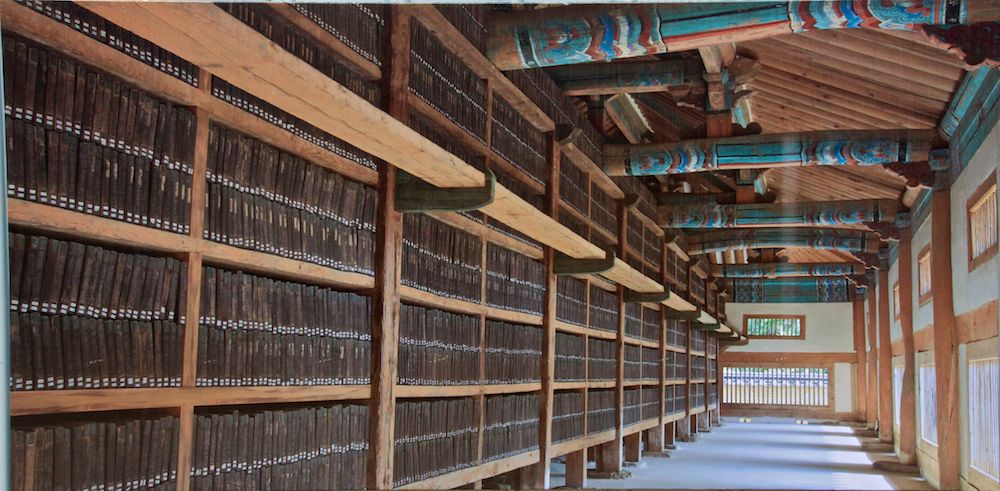 |
| The Tripitaka Koreanna |
The fire at the Palatine was not helped by the fact that the scrolls were packed tight in locked cupboards... to protect them from the damp. One of the oldest existing libraries in the world, the stunning Tripitaka Koreanna in the mountains of South Korea, owes its eight hundred year survival largely to an early but excellent ventilation system. The Rococo 17th century Mafra Library in Portugal, believe it or not, has been maintained by a permanently resident colony of bats, who eat the insects that would have otherwise long since destroyed the books.
 |
| Mafra Palace Library |
Ironically, the Mafra Library itself was funded by money from the savage destruction of another civilization's archives. The Incas did not have books, but "kept records on knotted and braided ropes, which the Spanish destroyed, believing them to be bad omens." But even worse, the entire history of their peoples was recorded in 1450 on golden plate, which the invading European armies melted down and used to (in part)...fund their own library.
That may just be one of the reasons why gold plate is not used to make books anymore.
Indeed, the changing physical nature of books - from clay tablets to papyrus scrolls to wooden printing blocks, to parchment, vellum and paper, has forced libraries to constantly remodel to accommodate not only their changing shape, but their increasing number. More books than ever before were published worldwide last year. No wonder that coincides with the first ever "bookless" library opening in Texas to offer its long range readers a space efficient digital service. But digital data is physical too. The Library of Congress in Washington has to store about 20 terabytes of data on its 830 miles of underground shelving, including a record of every tweet sent in the world ever.
 |
| Shelves at the Library of Congress Ft. Meade Storage Facility |
The 19th century vision of the municipal public library for all in the US and the UK may be under threat from a malign political ideology, but the truth is the library has never been a static or permanent public space. Countries like China are building new and amazing public buildings at great speed. For centuries in Western Europe, the library was a spare room off a cloister where a tiny number of educated monks could read a few hand inscribed volumes that were chained to the shelves to prevent theft. Now, anyone of us can download most books published in a second, often for free. That should never be used an argument against the value of the civic space our public libraries provide, but as the story of the book changes - so does the story of the library.
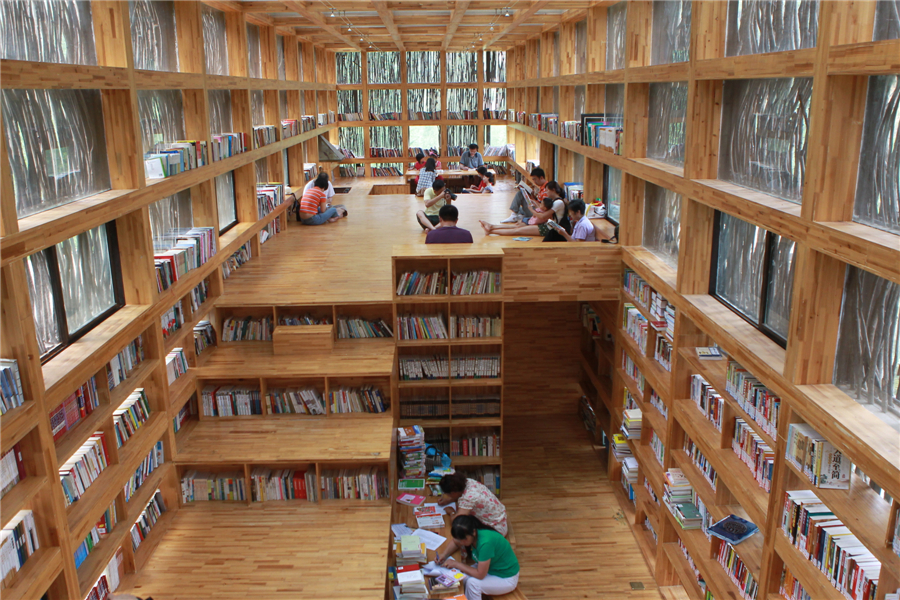 |
| The Liyuan Library in China (2012), featuring a radical design entirely made of bookshelves |
Blog: An Awfully Big Blog Adventure (Login to Add to MyJacketFlap)
JacketFlap tags: library cuts, library events, reading clubs, Sarah McIntyre, Tesco, The Reading Agency, Lari Don, Libraries, Add a tag
Exactly a week ago, I was privileged to launch the Tesco Bank Summer Reading Challenge Scotland (I needed to take a deep breath every time I said that!) in the Mitchell Library in Glasgow. In case the title doesn’t make it clear, it’s the libraries’ Summer Reading Challenge, in Scotland, sponsored by Tesco Bank. I was also privileged to also launch the local Summer Reading Challenge in Dundee two days later.
| Launching the Tesco Bank Summer Reading Challenge Scotland |
This year’s theme is Mythical Maze. And there couldn’t be a better theme for me – I write collections of myths and legends, I write contemporary adventures inspired by old myths, and one of my books even has a Maze in the title.
So that’s probably why I was asked to launch this year’s theme and challenge in Scotland. (And yes, I know it seems a bit early to all of you south of the border, but we grab summer earlier up here in Scotland, so the schools are already out and the libraries are already challenging kids to read books during the holidays.)
The launches were all positive and smiley. I met kids who had done previous challenges and were keen to do it again (which was great) and I met kids who had never done it before but were keen to give it a go it this year (which was even better.) So I had hoped to post a really cheerful blog for you all about summer and reading, with these wonderful illustrations by Sarah MacIntyre.
| With lovely librarian Ruth in Dundee, and a dragon behind us. |
But when I posted pictures of me with posters and books and dragons and kids online last week, someone who had been involved in a campaign that I supported to keep their local library open, a campaign that sadly failed, contacted me to say, this is lovely, Lari, but what about the kids who don’t have a local library any more?
And I didn’t have an answer. Sad face emoticons don’t really do it.
The Summer Reading Challenge brightens up and invigorates libraries all over the country and allows them to run fun family-focussed events. The different themes every year make reading relevant and exciting to lots of different children. Kids get involved, families get involved, authors get involved. It’s a brilliant scheme. Well done the Reading Agency for organising it, and Tesco Bank for supporting it in Scotland. But it can’t reach every child, because not every child has access to a library.
And perhaps that’s the real challenge for all of us.
I had intended to write a really cheerful summery sunny post for all you Awfully Big Blog fans, but the shadow over it is that even the best things we do with books can’t and don’t reach everyone. Not until we make sure every single child has access to a library.
So clearly my challenge is to get away from that dragon breathing down my neck and take up my sword again on the subject of library closures.
In the meantime, have a fun summer, losing yourself in mazes and finding new myths!
(Lari is now away polishing her sword…)
Lari Don is an occasional library campaigner, and also the award-winning author of 21 books for all ages, including a teen thriller, fantasy novels for 8 – 12s, picture books, retellings of traditional tales and novellas for reluctant readers.
Lari’s website
Lari’s own blog
Lari on Twitter
Lari on Facebook
Lari on Tumblr
Blog: An Awfully Big Blog Adventure (Login to Add to MyJacketFlap)
JacketFlap tags: John Dougherty, Horrible Histories, library cuts, Terry Deary, Add a tag
 By and large, children's authors are a friendly bunch. We tend to be nice, and helpful, and whilst we come in various levels of forthrightness there are very few I have ever met and not liked, even when we have been in disagreement.
By and large, children's authors are a friendly bunch. We tend to be nice, and helpful, and whilst we come in various levels of forthrightness there are very few I have ever met and not liked, even when we have been in disagreement.So I hope it will be understood how much it pains me to say that Horrible Histories author Terry Deary has lately been behaving like a great steaming prat.
For those of you who may have missed the row, it begins with Sunderland Council, like so many others, considering sweeping cuts to the library service - including closures - in order to save money. According to the Sunderland Echo, "Sunderland-born Terry Deary welcomed the plans". The Echo goes on to quote Deary as saying that libraries "have had their day... The book is old technology and we have to move on, so good luck to the council.” The following day Deary told the BBC that the closures were "long overdue".
Not unsurprisingly, a lot of authors got a bit cross about this. Now let me make one thing clear: I fully believe that Deary has the right to express his opinion. But that being so, others have the right to express their opinions of his opinion, and many did.
One such has been Alan Gibbons, tireless campaigner for libraries and the importance of the book. You can read Alan's statement here. I think it's pretty measured, all told, and addresses Deary's points, such as they are.
Deary's response? He rudely refers to Alan as "that Gibbon bloke", responds to his offer of a public debate with the offensively dismissive "in his dreams", misrepresents his comments, and with enormous irony accuses him of making "offensive personal remarks".
Oddly for someone with such sensitivity to "offensive personal remarks", Deary also claimed to the Independent that the authors who were criticising him were "the ones with small minds to match their small talents". Riiiiiiiiight. That would be authors like the small-minded and untalented Neil Gaiman, Terry Pratchett, Julia Donaldson, David Almond, Joanne Harris, Matt Haig...
I think that what distresses me most about all of this is that Deary seems to think he's being clever and radical, when in fact all he's doing is chucking about unsubstantiated and inflammatory assertions and then getting cross when people rise to the bait. But I get the feeling that this is his modus operandi.
Back in October 2011, I happened to hear Deary on Woman's Hour, debating with Susan Greenfield on the subject of traditional books and new technologies. Norwegian researcher Anna Mangan also contributed, citing empirical research that suggested that printed matter supports reading comprehension better than screen technology. Deary's response? He dismissed the research as "quite laughable" and "deeply flawed" and the researcher as "just another Luddite". The clip is worth a listen simply to hear Greenfield challenging Deary on his inconsistencies.
And inconsistent he is. The Independent article I linked to above has him saying both :
"It is for me to challenge the established, failing, unfair, irrelevant established order. It needs to be opened up for public debate,"
and:
"I haven’t the time to expend hot air on a meaningless discussion that would change nothing; nor have I the inclination to discuss a topic that no one really cares about."
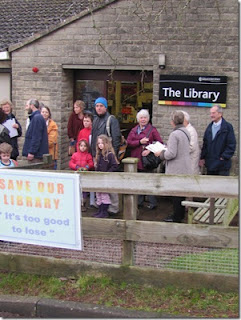 He also, having made the remarks quoted above, says in another interview "I never attacked libraries," despite, in an interview with The Guardian, claiming "libraries are cutting [authors'] throats and slashing their purses".
He also, having made the remarks quoted above, says in another interview "I never attacked libraries," despite, in an interview with The Guardian, claiming "libraries are cutting [authors'] throats and slashing their purses".And this seems to be the nub of the matter. Deary - one of the UK's most-borrowed authors - appears to believe that if libraries didn't exist then every borrowing would translate into a sale, and instead of £6,000 per year PLR, he'd be making an extra £180,000. Well, I can tell you, Terry - speaking as a not enormously high-earning author whose ten-year old reads even more than I do - that that's just not true. If libraries didn't exist, I'd have to read less. And so would my children. And so would all the other children who depend on libraries. Deary is attacking libraries, despite his protestations; and in doing so, whether or not he realises it, he's attacking literacy. And attacking them with arguments which are flimsy at best, and at worst simply unfounded.
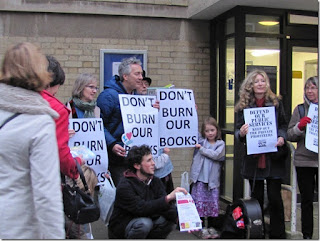 Deary is already a fierce critic of schools - in one interview suggesting that children "should leave school at 11 and go to work" - and has previously called for schools to be banned from using his books, and there is for me a huge irony in his now adding libraries to his hit-list. Because I very strongly suspect that were it not for all the teachers and librarians who have championed his books, few of us would ever have heard of Terry Deary.
Deary is already a fierce critic of schools - in one interview suggesting that children "should leave school at 11 and go to work" - and has previously called for schools to be banned from using his books, and there is for me a huge irony in his now adding libraries to his hit-list. Because I very strongly suspect that were it not for all the teachers and librarians who have championed his books, few of us would ever have heard of Terry Deary.Two comments to finish with: firstly, I trust that Mr Deary - should he ever deign to read this post, written as it is by someone he would doubtless dismiss as having a small mind and a small talent - will not accuse me of having called him a great steaming prat. I haven't. I have accused him of lately behaving like one, which is quite different.
And secondly: petty of me, perhaps, but I can't help but be amused by this.
_________________________________________________
John's website is at www.visitingauthor.com.
He's on twitter as @JohnDougherty8
His most recent books include:
Finn MacCool and the Giant's Causeway - a retelling for the Oxford Reading Tree
Bansi O'Hara and the Edges of Hallowe'en
Zeus Sorts It Out - "A sizzling comedy... a blast for 7+" , and one of The Times' Children's Books of 2011, as chosen by Amanda Craig
Blog: An Awfully Big Blog Adventure (Login to Add to MyJacketFlap)
JacketFlap tags: Libraries, cuts, John Dougherty, library cuts, Add a tag
The bookshelves were tall enough that you’d have to reach up to the top shelf, and they filled up the library and were packed with books, so tightly you’d need both hands to squeeze browsed unchoices back into their places; and every time you came, there would be new treasures hidden on those shelves - here a book you’d been longing to read; there another you didn’t know you were looking for until you found it.
The children’s section, too, was bursting with the new and the old. Brightly coloured cushions in animal shapes invited you in and made you welcome.
There was life there. Then the council made its plans.
“We’re improving things,” they said, as they ripped out the counter, leaving fade-marks on the carpet, and stuck up racks of battered DVDs: films you’d seen already, or didn’t want to.
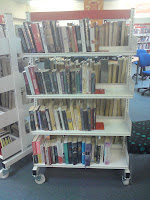 “We’re improving things,” they said, as they sent out redundancy notices, and hid the few remaining staff - or the volunteers who replaced them, or the temps brought in for the day from other branches - behind a small table round the corner.
“We’re improving things,” they said, as they sent out redundancy notices, and hid the few remaining staff - or the volunteers who replaced them, or the temps brought in for the day from other branches - behind a small table round the corner.“We’re improving things,” they said, as they tore out the tall shelves and wheeled in small ones, four-tiered trolleys which still seemed suddenly too roomy for the few books that remained.
“We’re improving things,” they said, as they inserted automatic tellers which check out your choices but never see your face or learn your name.
“We’re improving things,” they said, as they hollowed out our libraries and left them to rot from the inside.

Now, the first thing to meet your eye is the trolley of old stock for sale. You can visit, browse, borrow without a single human encounter; when someone deals with you, it may be someone you have never seen before, and never will again. The gaps in the shelves gape like those in uncared-for mouths with diseased gums, and the forward-facing books do nothing to hide the decay. The brightly-coloured cushions have faded and sagged out of shape, and will not be replaced.
And one day, they will tell you that no-one uses libraries any more; and they will not ask themselves why that might be; and they will close and lock the doors forever.
Remember this, when they tell you they are investing in the community, and in the future.
Remember this, when they talk of their commitment to education; to driving up standards; to literacy and reading levels.
Remember this, when they stand on your doorstep, smiling and asking for your vote.
Blog: An Awfully Big Blog Adventure (Login to Add to MyJacketFlap)
JacketFlap tags: education, Michael Rosen, visualization, John Dougherty, phonics, library cuts, Michael Gove, Add a tag
Blog: An Awfully Big Blog Adventure (Login to Add to MyJacketFlap)
JacketFlap tags: library cuts, trenches, Pomona public library, Oxnard public library, Laura Ingalls Wilder, Add a tag
I've just come back from a visit to California and suprise surprise - its not just the UK public libraries under threat of cuts. Pomona Public Library according to the L.A. Times two weeks ago, could be facing its 'final chapter'. To add insult to injury, this is the library which stores the original handwritten manuscript of "Little Town on the Prairie" donated by the author herself, Laura Ingalls Wilder.
"You make good use of your library I am sure," Laura wrote in May 1950. "How I would have loved it when I was young but I was far from a library in those days." One of America's most beloved author's began corresponding with the Pomona Public Library's children's librarian, who was a fan of her books and this is how the manuscript came to be donated. There is even a room named in the author's honour in the library. Yet none of this may be enough to save it from closure. The library currently has a budget of $1.6 million and is open 26 hours a week. They have been offered a chance to stay open if they can cut the budget to $400,000. I have no idea how these figures compare to UK library budgets but anyone can see that the cut is just too much. "Any book you haven't read is a new book," is the library's slogan and it is truly heartbreaking to hear that they might close.
However it is not all doom and gloom. One hour up the coast from L.A. is the city of Oxnard where my 95 year old aunt, Stella lives with her husband Bob. Stella was born in London in 1916, the year of the Somme. Her father, my grandpa, Joe Hyams, was a gunner at the front. He's the one with the cross next to him.
Stella has lived in California since the 1960s. For the past 20 years she has volunteered at the Oxnard Public Library and is still a very valued member of the team. Here she is at her work station. She catalogues the CDs.
It was great to have a chance to look round a local library in the States and I was enormously impressed. The children's library which occupies only part of the ground floor is absolutely vast - about twice the size of the entire public library in Golders Green near me.
Display Comments Add a Comment
Blog: An Awfully Big Blog Adventure (Login to Add to MyJacketFlap)
JacketFlap tags: Alan Gibbons, Library cuts, Savita Kalhan, Library Campaign, Shamila Akhtar, Libraries, Add a tag
Libraries are under threat and there has been a huge outcry against cuts and closures that span the whole of the United Kingdom. And rightly so. Libraries are precious and should be placed under a protection order.
You will all have read or written many articles and blogs about the intrinsic importance of libraries and what they mean and what they provide for the individual, for children, for adults, for the disadvantaged, for society in general.
This is what they meant to me when I was a child.
I came to live in England with my parents when I was 11 months old. My father was an educated man – he spoke and wrote Hindi, Urdu and English, but was forced to leave school much earlier than he would have liked in order to help his parents. My mother never went to school. She was put to work when very young and although all her younger sisters went to school, she missed her chance and by twelve it was too late for her. She speaks only Punjabi, but can understand some Hindi, mainly learnt from films. She was brought up in a village, so as a child her experiences were limited, her knowledge of the world severely restricted.
My parents worked very hard. Our family grew, and we were raised in a very traditional environment. We had to work hard at school and at home. And we weren’t allowed to go out at all. Except to one place – the library.
Both my parents were in complete agreement about this. My father because he wanted us to do well, excel in school and in our studies, make something of ourselves. Even though he was in many respects a traditional Punjabi man, he never considered himself saddled with five daughters. He expected as much from us as if we were boys. And my mother because of her reverence for books. She couldn’t read them herself, but for her they were the source of wisdom, knowledge and understanding, and therefore the means to escape from poverty and derision. She held them in awe and respect. We were never allowed to put books on the floor, or anywhere they might get damaged.
We couldn’t afford to buy any books. So we joined our local library.
Blog: An Awfully Big Blog Adventure (Login to Add to MyJacketFlap)
JacketFlap tags: Libraries, Library cuts, Leila Rasheed, Library Campaign, Shamila Akhtar, Add a tag
Today’s blog post is not by a writer. It is by someone much more important: a reader.
The reader is a lady named Shamila Akhtar, who has started a petition to keep her local library - Pleck Library in Walsall - open. I quote from the Pleck residents’ group website: ‘Pleck is recognised as the most deprived area in the borough of Walsall.’ Walsall itself is in the West Midlands, my home region and one of the areas hardest hit by spending cuts. If a library is needed anywhere, surely it is needed here.
I am proud to introduce Shamila as a guest blogger:
- Leila Rasheed
WHAT MY LIBRARY MEANS TO ME
by Shamila Akhtar
Everyone's talking about why their library should stay open. It's such a turmoil of emotion, every single library is special to the people who use it. In Walsall, 6 of 16 libraries will close. It's awful - I feel like the small libraries are competing against each other to survive. Like we’re in a slaughter house and all jostling to stay at the back and not get picked. What a sad situation!! Every single library should be left alone.
What is it about that these buildings and the resources within that's turning people like me into campaigners? I'm a person who is not the politician, the local councillor or even the vicar who posed for our Press Event photo. I am a little shy, timid in approaching the writing elite to ask for their support. How will I come across? What will I say?
Perhaps I can share some of the magic moments the library creates, delivers, facilitates.
I have seen a father sitting there on a tiny chair reading to his boy, speaking not so well English but he was there and he was trying. His son gets his undivided attention, they get special time together.
I have turned the final page of a book we borrowed from there, to have a crocodile pop up. The boys want me to make him snap at their fingers, we protect the book so baby does not damage th
Blog: An Awfully Big Blog Adventure (Login to Add to MyJacketFlap)
JacketFlap tags: NPR, John Dougherty, Library cuts, Save Our Libraries Day, Flying Authors, Gloucestershire, Libraries, Add a tag
 I must have been mad. Gloriously, bonkersly, wonderfully mad. Whatever possessed me to suggest I mark Save Our Libraries Day by becoming a Flying Author?
I must have been mad. Gloriously, bonkersly, wonderfully mad. Whatever possessed me to suggest I mark Save Our Libraries Day by becoming a Flying Author?
Not literally flying, I hasten to add, despite the misleadingly Bigglesish publicity picture. No, the idea was that I dash around the county, doing quick 20-minute sessions at each of the libraries that are endangered by the, let's be frank, utterly irresponsible and ridiculously short-termist cuts proposed by Gloucestershire County Council.
Unfortunately, it's a big county. And there are a lot of endangered libraries. Under the present plans, 29 of the county's 38 libraries are likely to suffer huge reductions in service, with up to 17 of those likely to close altogether. Not to mention the mobile libraries, which soon no one will be able to mention except in the past tense. Yes, they're getting rid of the entire mobile library service.
Anyway, it soon became apparent that I wasn't going to be able to do more than 9 in a day. And that was without stopping for lunch. Thank goodness, then, for Cindy Jefferies, who quickly donned her own metaphorical goggles and flight jacket to become Flying Author number two. The marvellous, hardworking and very lovely people at Friends of Gloucestershire Libraries began to get very excited - and it didn't end there. As the days rolled by, more authors, poets, illustrators and storytellers joined the squadron. Not all of them were technically Flying Authors - some stayed at a single library for a day; some could only give an hour or two of their time - but all of them helped to make it a huge success. They were, in no particular order:
Thank goodness, then, for Cindy Jefferies, who quickly donned her own metaphorical goggles and flight jacket to become Flying Author number two. The marvellous, hardworking and very lovely people at Friends of Gloucestershire Libraries began to get very excited - and it didn't end there. As the days rolled by, more authors, poets, illustrators and storytellers joined the squadron. Not all of them were technically Flying Authors - some stayed at a single library for a day; some could only give an hour or two of their time - but all of them helped to make it a huge success. They were, in no particular order:
- Marcus Moore
- the heroic Katie Fforde, who did several events despite having spent the previous night sleeping rough for charity in a public park!!!
- Hannah Shaw
- Sue Limb
- Jamila Gavin
- Alice Jolly
- Shoo Rayner
- Chloe of the Midnight Storytellers
- Jane Bailey
- Chris Manby
- Philippa Roberts
- Graham Mitchell
- Vicky Bennett
- Peter Wyton
- Roger Drury
- John Bassett of Spaniel In The Works Theatre Company
By the time Saturday 5th Feb came, we had something planned in EVERY SINGLE LIBRARY IN THE BOROUGH!
Well - except for the two that are closed on Saturdays. And the one in the prison.
But those aside, we had a right rollicking day of events to look forward to. You can see a fuller, but possibly still not quite complete, list of events (plus weblinks) here.
Blog: An Awfully Big Blog Adventure (Login to Add to MyJacketFlap)
JacketFlap tags: Libraries, Library cuts, Add a tag

Better and more dedicated bloggers have blogged about the crisis facing our libraries, including Lucy Coats, Keren David and Candy Gourlay. Please read their posts from yesterday, because I can't put it better than they can.
I can, though, tell you what my local library meant to me as a child, because I'll never forget standing at my bedroom window one night, with my parents and my brother, watching the glow light up the sky as it burned to the ground. I remember being heartbroken, because it was the place I loved to be: the place that brought me Paddington Bear and the Famous Five and so many other worlds of wild excitement.
All I could think of that night, and the next day as we went to look at the ruins, was all those worlds, all those words, all those books going up in smoke. At eight I could think of no greater tragedy. I fantasised that the local press would interview me, as the library's most fanatical client. I even practised what I'd say.
I'd discovered Snoggle in that library, an odd little egg-shaped alien created by JB Priestley. He was as alone and far from home as ET, and even more heart-tugging. Obsessed, I'd taken the book with me into the garden, then left it lying there to be rained on. I had only recently returned it, terrified and guilty, to the librarian (who was very kind and forgiving, and who didn't have me arrested as I assumed she would). That night I remember wishing I'd kept it. More than thirty years later I had to track down a copy for my own kids, but I'm still afraid to read it, afraid to shatter the memory of one of the best-loved books of my childhood.
They rebuilt Wishaw Library: that's it in the photo above. It will have changed with the times, adapted, modernised. It must offer so much more now than it used to. I'd love to visit some time (hint hint). My nostalgic memories of the old library won't be any stronger than the memories the new one is creating right now for its thousands of visitors.
But looking for images of the beautiful old library, or even of the fire that destroyed it, I can't find any. Not one. It's as if that library never existed. Maybe I dreamed it.
Horrible, horrible thought. Let's not let it happen to all the others.
Blog: An Awfully Big Blog Adventure (Login to Add to MyJacketFlap)
JacketFlap tags: Libraries, Lucy Coats, Alan Gibbons, Library cuts, Campaign for the Book, Roz Asquith, Add a tag
Then last summer I started hearing about cuts, and books being thrown into skips; reading about good, dedicated, knowledgable librarians getting the sack, as well as libraries being turned into computer suites, or closed completely--and I started to get very angry. When I was growing up, I was lucky enough to live in a house where there were books. But they weren’t terribly interesting books to me at that time (apart from my very own set of Beatrix Potter), being mostly either obscure French novels in the original language, heavy classics or technical sporting tomes. When I wanted to move on from Janet and John, Basingstoke Public Library was the place I haunted, every week, and sometimes more often if I could persuade my mother to take me. Without Basingstoke Public Library and its knowledgeable and patient children’s librarian, I wouldn’t be half as well-read as I am now, because I was a voracious devourer of anything and everything once I got going, and we simply couldn’t have afforded to buy all the endless picture books, Puffins and whatnot which I lugged home and curled up with with a happy sigh of anticipation.
Latin: liber, libri (m)—a book. It’s all in the name--it's why they are called libraries. Libraries, in my opinion, are where a copy of every book written is meant to live at some time in its life. The books in libraries are meant to be freely borrowed and then to educate, to give pleasure, to take you to other worlds and all the myriad other things they do, and afterwards be returned to do it all over again for someone else, (probably on the advice of one of those aforementioned patient and knowledgeable librarians). But now, apparently, books are out, and computer suites are in. While I am the first to admit the benefits of technology, this does not mean that real books with actual pages are dead, obsolete, extinct, nor that children no longer need or want them. Of course, as an author, I would say that. I write some of the books that are in those same libraries, and it is there that some of my readers make their first acquaintance with me (many, many thousands of them, according to the nice people at PLR today). And I don’t wish ever to live in a world where the marvellous cartoon by Roz Asquith at the top of this page is a reality. So that’s why, despite my retiring nature, I got involved with The Campaign for the Book, instigated by fellow author Alan Gibbons, himself a tireless and wonderful activist. I haven’t set the campaigning world on fire yet, but I have set up and am running the Campaign’s Facebook page in order to try and spread the word. If you are reading this blog, and you care about children continuing to have access to and advice on actual books in libraries, both in school and out, instead of merely sitting in what Alan calls ‘a café with a Playstation in the corner,’ then please go into your local library and tell them you care. They’ve never needed you more. Join us. Please.








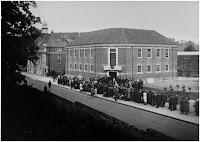



Well said, John!
Since I appear to be one of these authors with a small mind and a small talent, I feel totally justified in suggesting that Terry Deary has a small something else.
Loved it, John!
Thanks! Helena Pielichaty has also blogged about this today.
Well put. One of the ironies of all this is that Amazon have just patented the right to re-sell ebooks and earn full share of the profits (see link). One wonders how Terry Deary will take this news. I can't see any difference between that and libraries initially purchasing the books and then loaning them for free. I wonder if he'll offend the ebook community next? I know he's lost his fan base amongst librarians.
http://www.guardian.co.uk/lifeandstyle/2013/feb/16/amazon-ebook-patent-lucy-mangan
Nicely argued, John!
Agree and agree again.
Sigh - when will people realise that libraries are at the very centre of any community? When will they realise that, much as we might want to, none of us can buy every book we want to read?